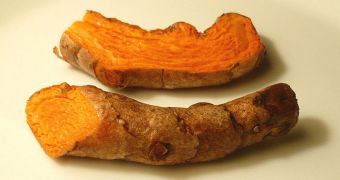In a new study on the influence of human saliva on the development of head and neck cancer, researchers in the United States determined that the main active ingredient in the spice turmeric, called curcumin, plays an important part in suppressing a very important cell signaling pathway.
That particular pathway plays an important role in the development of the two types of cancer, experts from the University of California in Los Angeles (UCLA) Jonsson Comprehensive Cancer Center (JCCC) say in their research paper.
But the effects curcumin have don't stop here. The presence of this chemical in saliva also triggers a reduction in the expression of certain pro-inflammatory signaling molecules called cytokines. When these molecules are active in saliva, they promote cancer growth.
Details of the new investigation were published in the September 15 issue of the esteemed journal Clinical Cancer Research, a peer-reviewed magazine edited by the American Association of Cancer Research. Dr. Marilene Wang was the senior author of the paper.
The expert holds an appointment as a JCCC research scientist and a professor of head and neck surgery at the university. She says that the naturally occurring spice has always been widely used in South Asian and Middle Eastern cooking.
Experts have also known about its medicinal properties for a long time. Since ancient time, turmeric has been used for its anti-inflammatory properties. It has also been used to sooth pains, make wounds close and heal faster, and as an anti-aging agent.
“This study shows that curcumin can work in the mouths of patients with head and neck malignancies and reduce activities that promote cancer growth,” says Wang, who has been studying these compounds for many years.
“And it not only affected the cancer by inhibiting a critical cell signaling pathway, it also affected the saliva itself by reducing pro-inflammatory cytokines within the saliva,” the expert goes on to say.
“We believe curcumin could be combined with other treatments, such as chemotherapy and radiation, to treat head and neck cancer. It also could perhaps be given to patients at high risk for developing head and neck cancers […] as well as to patients with previous oral cancers to fight recurrence,” she adds.
The chemical also has numerous biological advantages, such as for example the fact that it is tolerated in the body, can be found anywhere, is readily accessible, and can readily be introduced into diets.
The team now plans to conduct additional investigations into how the chemical works so efficiently against dangerous cancers.

 14 DAY TRIAL //
14 DAY TRIAL //